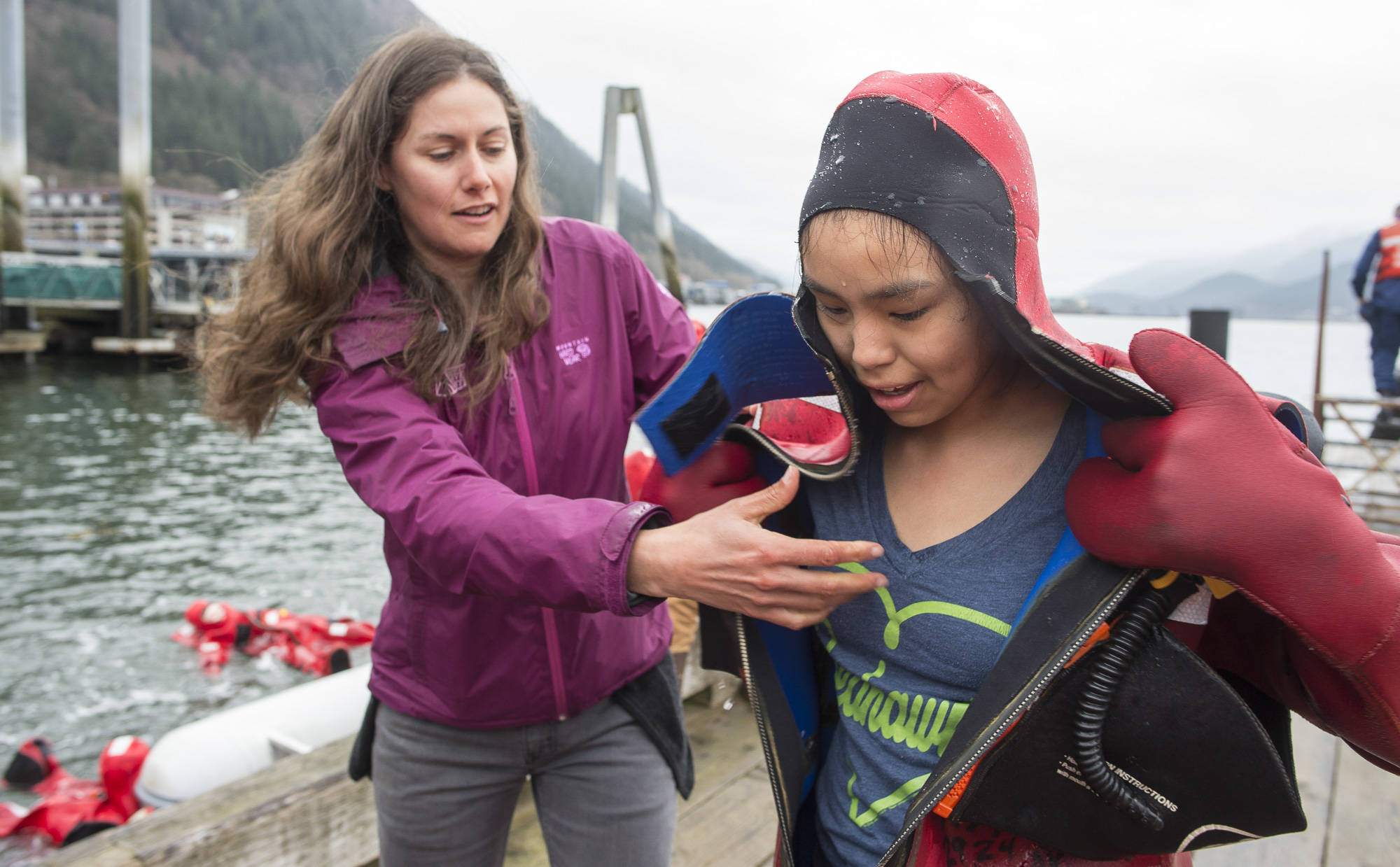Lillie Fredrick, a sixth-grader at Dzantik’i Heeni Middle School, is no stranger to the water in Juneau. She goes fishing and pulls crab pots with her family.
While she understands the importance of safety in the wilderness, one can never be too prepared. That is the idea behind this past week’s DHMS safety training course with the 17th District Coast Guard and the Alaska Marine Safety Education Association.
“It is a really successful program,” Jeannie Wolfe, a sixth-grade teacher at DHMS, said. “When the students leave sixth grade they have the understanding of some boat safety, cold water safety and some survival skills.”
One of the courses involves having the students get into an immersion suit and learn how to properly float in frigid water.
“We got to learn how to be really safe if we get into a bad situation on the water,” Fredrick, 11, said.
The training, Wolfe explained, prepares the students in a safe and secure way.
“Given where we live it is important to know how to survive in our environment,” Wolfe said. “It can be very cold and very wet. We want to put the kids in real-life situations so they can use those skills if they ever need them. Hopefully, they won’t ever need them.”
Last year, 20 people died in boating-related deaths in Alaska, according to the Alaska Division of Parks and Outdoor Recreation’s Office of Boating Safety.
Sixth-grader Kaeden Quinton said the program is helpful because it gives the students lifelong knowledge that can be used at a moment’s notice.
“It is really important because if you are out boating, this kind of stuff can happen at any time,” Quinton, 12, said.
Harris Monsef was in a class where the students were learning how to make a survival kits. The kits includes a fire starter, shelter, first aid supplies and a signal. Monsef said learning this type of information in sixth grade is helpful because when students get older they may not have this kind of opportunity.
“They are teaching us how to make a survival kit so if we get stuck somewhere, we can use it,” Monsef, 11, said. “When kids are older they may not get taught this and it’s good to know.”
Classroom work is also part of the program. The students learn the seven steps of survival, which are recognition, inventory, shelter, signals, water, food and play.
“We learned the different things you should do and when to do them,” Fredrick said. “You do the recognizing part first so you understand the situation you are in.”
Coast Guard Lieutenant Ian McPhillips, who was helping with the program’s cold water safety, explained why a training course like this is valuable.
“Kids spend so much time on the water with their parents, recreational boating and some of their parents are commercial fisherman. They may also go into that industry,” McPhillips said. “So starting them young is imperative to their lives and to the community.”
Following the three days of training, the classrooms then spent an overnight trip at Echo Ranch where they utilized the skills they learned. The kids do team-building activities, fire building and mapping compass practice.
“We put them into the wilderness to practice these skills they have been learning,” Wolfe said. “They used skills they learned in the classroom and here at the docks and apply them out at Echo Ranch.”
DHMS sixth-grade teacher Laura Scholes said at this particular age, students have the best chance to learn and retain this knowledge going forward.
“They all have boats, they all live near the ocean and they all go hiking,” Scholes said. “We lose people in the woods and overboard every year. So learning at this age, when they are still paying attention, is the perfect age. It is also a lot of fun, too.”
• Contact reporter Gregory Philson at gphilson@juneauempire.com or call at 523-2265. Follow him on Twitter at @GTPhilson.

